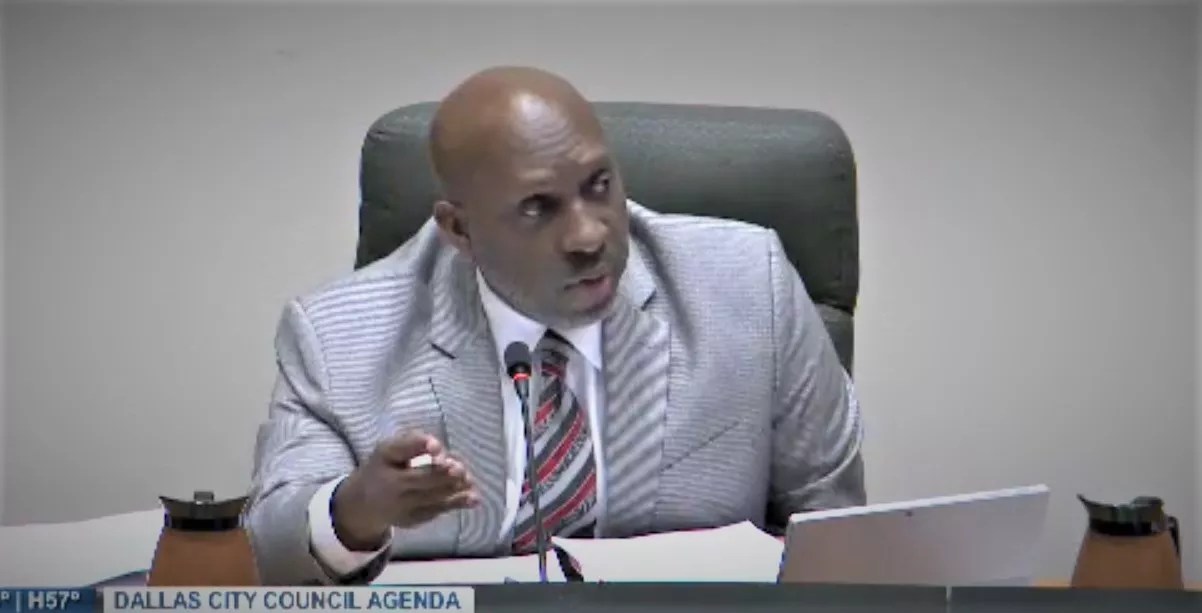
dallascityhall.com

Audio By Carbonatix
The RIGHT Care program plays a starring role in T.C. Broadnax’s newly proposed city budget, topping the list of highlighted police initiatives.
The RIGHT Care pilot program operated a single team in the South Central Dallas Police District starting in January 2018. Officials pegged the pilot’s success to a 20% reduction in admissions to Parkland’s psychiatric emergency rooms within that district over a two-year period, and expanded the program from one to five teams, covering the entire City of Dallas.
Between 7 a.m and 11 p.m., a mental health clinician from Parkland Health and Hospital Systems is stationed in Dallas’ 911 call centers, flagging incoming calls as mental health emergencies. When a call is flagged, a team consisting of a Dallas Police officer, a paramedic from Dallas Fire and Rescue, and another Parkland mental health clinician is dispatched to the scene.
The reduction in admissions, according to officials, demonstrated RIGHT Care’s efficacy in providing a new and innovative response to 911 calls involving people with mental illness, who are about 16 times more likely to be killed by law enforcement than others.
But some policy experts take issue with the RIGHT Care model. They argue cops should not be included in the city’s mental health crisis response teams at all.
“A lot of data now available on crisis care, looking at various forms of response, says that a clinician and a paramedic are really all you need,” said Ira Burnim, Legal Director of the Bazelon Center for Mental Health Law. “It’s an overuse of police personnel.”
BJ Wagner, a Senior Fellow of Justice System Policy at the Dallas-based Meadows Mental Health Policy Institute, designed the RIGHT Care program and played a central role in its implementation and data collection processes during its first two years. He disagrees with excluding police officers from mental health emergency calls.
“A lot of data now available on crisis care, looking at various forms of response, says that a clinician and a paramedic are really all you need,” Ira Burnim, Legal Director, Bazelon Center for Mental Health Law
“We can’t send only a civilian team to a high acuity public safety emergency,” she said.
The purpose of including a DPD officer on RIGHT Care teams, Wagner said, is to provide an option for mental health crisis response in situations when the crisis “has a public safety element.”
Wagner pointed to Mobile Crisis Outreach Teams (MCOT) programs as the alternative to “mental health emergencies that don’t pose a risk to public safety.” MCOT dispatches a two-person team consisting of a paramedic and a social worker in response to emergency calls. MCOT programming varies widely by county; MCOT is embedded within the 911 call center in some, and is operated through a separate crisis hotline number in others.
Wagner said that MCOT programs simply don’t go far enough – and that including a police officer on mental health crisis teams is necessary. “In doing that, and only that, and not having a first responder public safety response, we are not offering an alternative response to our loved ones who have the type of mental health emergency that causes a public safety concern,” Wagner explained.
Including a police officer on a mental health crisis response team still presents the danger of a violent or fatal encounter between a law enforcement officer and the person in crisis, Burnim said.
But according to Wagner, police presence on RIGHT Care teams is increasing the safety of those in mental health crises, not decreasing it.
“We will never rid ourselves of those tragic headlines, we will never ensure that vulnerable populations living in vulnerable neighborhoods who have concerning mental health emergencies that rise to the need of public safety responses will ever receive anything other than a typical police response,” Wagner said.
RIGHT Care will receive an additional $2 million in funding if Dallas City Council members approve Broadnax’s budget in September. DPD will receive about $53 million in general fund money, plus $8.5 million in federal COVID-19 stimulus money.